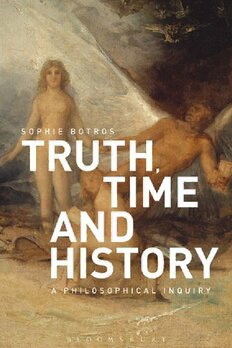
Truth, Time and History: A Philosophical Inquiry PDF
289 Pages·2017·3.817 MB·English
Most books are stored in the elastic cloud where traffic is expensive. For this reason, we have a limit on daily download.
Preview Truth, Time and History: A Philosophical Inquiry
Description:
Truth, Time and History investigates the reality of the past by connecting arguments across areas which are conventionally discussed in isolation from each other.Breaking the impasse within the narrower analytic debate between Dummett’s semantic anti-realists and the truth value link realists as to whether the past exists independently of our methods of verification, the book argues, through an examination of the puzzles concerning identity over time, that only the present exists. Drawing on Lewis’s analogy between times and possible worlds, and work by Collingwood and Oakeshott, and the continental philosopher, Barthes, the author advances a wholly novel proposal, as to how aspects of ersatz presentism may be combined with historical coherentism to uphold the legitimacy of discourse about the past.In highlighting the role of historians in the creation and construction of temporality, Truth, Time and History offers a convincing philosophical argument for the inherence of an unreal past in the real present.This book is about the metaphysical status of the past and the knowledge we can have of it, concluding that, most feasibly, only the present exists, the past being progressively constituted through the disciplined work of historians. The first part examines the arguments between the truth value link realists and Dummett’s anti-realists as to whether the past exists independently of our methods of verification or is constructed from present evidence, and concludes that the debate results in a stalemate. The second part sets out a spectrum of positions on time and change from eternalism at one extreme, which excludes any coming into being or passing away to Dummett’s radical relativism of the present, on the other. Rejecting eternalism and offering a preliminary sketch of presentism, the question is raised whether truth value link realism may not represent an acceptably moderate tensed alternative to presentism, which allowing for continuity and discontinuity meets Dummett’s accusation that these realists cannot account for.”living in time”. It is argued through a discussion of Wiggins’ claim that change is necessarily undergone by entities falling under kinds, that moderate tensed theorists cannot admit the dynamism of change, yet also respect Leibniz’s strictures on identity. The most plausible, if radical, solution, it is suggested, is presentism, and key ideas are explored as to how an unreal past may inhere in the real present. The third part defends the coherentist account of history of Collingwood and Oakeshott, before advancing the proposal that the role of realist truth makers, played, in ersatz presentism, by abstract past times, is transferred to works of history, whose content, governed by coherentist principles, is not required to correspond with independently existing objects.
See more
The list of books you might like
Most books are stored in the elastic cloud where traffic is expensive. For this reason, we have a limit on daily download.
